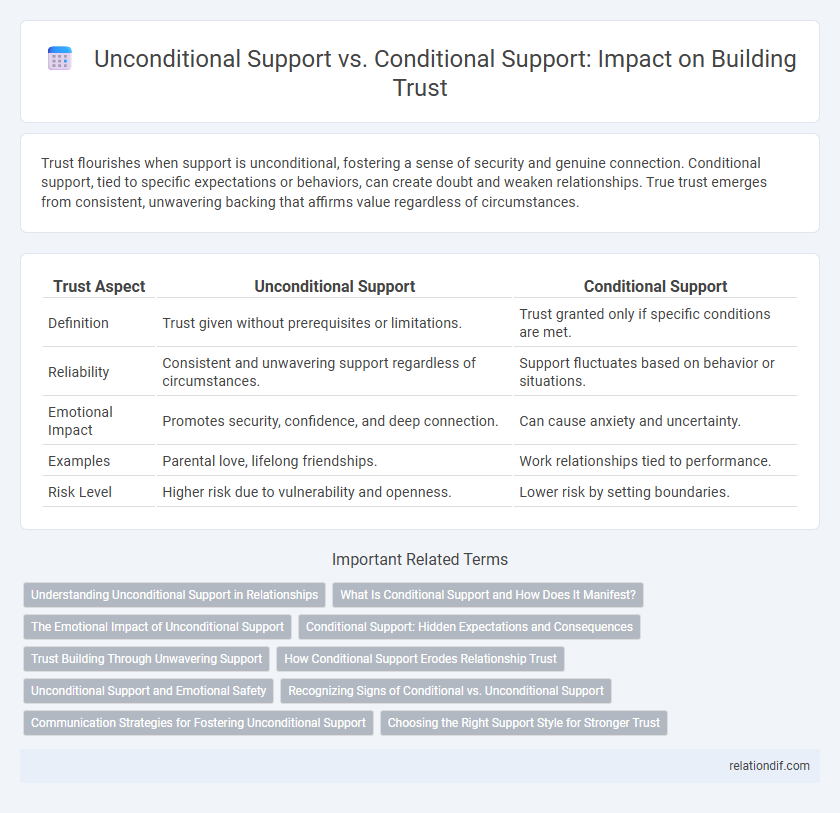Trust flourishes when support is unconditional, fostering a sense of security and genuine connection. Conditional support, tied to specific expectations or behaviors, can create doubt and weaken relationships. True trust emerges from consistent, unwavering backing that affirms value regardless of circumstances.
Table of Comparison
| Trust Aspect | Unconditional Support | Conditional Support |
|---|---|---|
| Definition | Trust given without prerequisites or limitations. | Trust granted only if specific conditions are met. |
| Reliability | Consistent and unwavering support regardless of circumstances. | Support fluctuates based on behavior or situations. |
| Emotional Impact | Promotes security, confidence, and deep connection. | Can cause anxiety and uncertainty. |
| Examples | Parental love, lifelong friendships. | Work relationships tied to performance. |
| Risk Level | Higher risk due to vulnerability and openness. | Lower risk by setting boundaries. |
Understanding Unconditional Support in Relationships
Unconditional support in relationships means offering unwavering confidence and care regardless of circumstances, fostering deep trust and emotional security. Unlike conditional support, which depends on meeting specific expectations or behaviors, unconditional support strengthens bonds by embracing acceptance and empathy. This form of trust encourages open communication and resilience, anchoring relationships in genuine understanding and mutual respect.
What Is Conditional Support and How Does It Manifest?
Conditional support is a form of trust that depends on specific behaviors or outcomes, where approval or assistance is granted only if certain criteria are met. It often manifests through setting explicit expectations, such as requiring achievements, compliance, or particular actions before offer of help or acceptance. This type of support can lead to instability in relationships due to its reliance on performance rather than inherent loyalty or commitment.
The Emotional Impact of Unconditional Support
Unconditional support fosters a deep sense of security and belonging, significantly enhancing emotional stability and resilience. When individuals experience unwavering acceptance, they are more likely to develop trust and openness, leading to healthier relationships. This type of support reduces anxiety and promotes mental well-being by affirming intrinsic worth beyond circumstances or achievements.
Conditional Support: Hidden Expectations and Consequences
Conditional support often involves hidden expectations that can undermine trust, as recipients may feel pressured to meet unstated demands to maintain the relationship. These covert conditions create uncertainty and anxiety, leading to emotional strain and decreased authenticity in interactions. The consequences include diminished self-esteem and weakened bonds, making trust fragile and contingent rather than solid and enduring.
Trust Building Through Unwavering Support
Unwavering support fosters deep trust by providing a reliable foundation regardless of circumstances, differentiating unconditional support from conditional support, which may fluctuate based on outcomes or behaviors. Consistent encouragement strengthens relationships, allowing individuals to feel secure and valued without fear of judgment or withdrawal of help. This steadfast presence cultivates mutual respect and reinforces long-term trust essential for resilient connections.
How Conditional Support Erodes Relationship Trust
Conditional support undermines relationship trust by creating uncertainty and inconsistency in emotional availability, causing partners to doubt each other's reliability. When support is dependent on specific behaviors or achievements, it fosters fear of rejection and inhibits open communication. This dynamic weakens the foundation of trust, as individuals feel they must constantly prove their worth to maintain support.
Unconditional Support and Emotional Safety
Unconditional support fosters emotional safety by providing consistent acceptance regardless of circumstances, which strengthens trust and deepens relational bonds. This form of support allows individuals to express their true selves without fear of judgment or rejection, creating a secure environment essential for mental well-being. Emotional safety established through unconditional support enhances resilience and promotes open, honest communication within personal and professional relationships.
Recognizing Signs of Conditional vs. Unconditional Support
Recognizing signs of conditional support involves identifying behaviors that change based on performance, approval, or specific outcomes, often accompanied by implied expectations or ultimatums. Unconditional support, by contrast, manifests as consistent encouragement and acceptance regardless of circumstances, reflecting unwavering commitment and trust. Understanding these distinctions helps foster deeper connections by promoting reliability and emotional safety in relationships.
Communication Strategies for Fostering Unconditional Support
Effective communication strategies for fostering unconditional support emphasize active listening, empathy, and non-judgmental responses, creating a safe environment where individuals feel valued without fear of rejection. Techniques such as open-ended questions, reflective statements, and regular affirmations reinforce trust and emotional safety, which are critical components distinguishing unconditional support from conditional support. Consistently demonstrating understanding and acceptance encourages honest dialogue and strengthens relational bonds beyond situational or performance-based conditions.
Choosing the Right Support Style for Stronger Trust
Unconditional support fosters stronger trust by promoting acceptance and reliability, creating a secure foundation for relationships. Conditional support, while sometimes necessary for setting boundaries, can undermine trust if perceived as inconsistent or judgmental. Choosing the right support style depends on emotional needs and context, with unconditional support generally strengthening trust through unwavering commitment.
Unconditional support vs Conditional support Infographic

 relationdif.com
relationdif.com